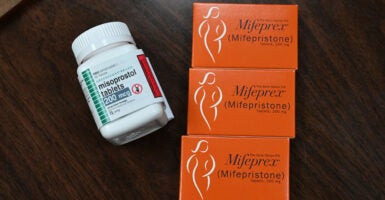When then-Arkansas Gov. Bill Clinton accepted the Democratic presidential nomination in 1992, he told the crowd at that party’s convention, “Abortion should be safe, legal, and rare.”
That was in July. The following January—two days after his inauguration—Clinton made promoting abortion a central focus of his new administration.
“Mr. Clinton signed five abortion-related memorandums on the 20th anniversary of Roe v. Wade,” The New York Times reported on Jan. 23, 1993.
Clinton’s abortion directives, as reported by The Associated Press, included allowing “abortion counseling at federally supported clinics,” permitting “research using fetal tissue from abortions,” allowing “abortions at military hospitals,” permitting “funding for overseas population-control programs,” and reviewing “a ban against importation of RU-486, the French abortion pill.”
In his written memorandum directing the Food and Drug Administration to carry out that last provision, Clinton also stated, “I direct that you promptly assess initiatives by which the Department of Health and Human Services can promote testing, licensing, and manufacturing in the United States of RU-486 or other antiprogestins.”
In September 2000, not long before Clinton finished his second term in office, the FDA approved the use of abortion-inducing drugs in the United States.
In a legal complaint filed last November in the U.S. District Court for the Northern District of Texas, lawyers for the Alliance Defending Freedom, who are representing a number of medical organizations and doctors in a suit against the FDA, challenged this FDA action.
“First, the FDA never had the authority to approve these drugs for sale,” their complaint says. “In 2000, the FDA approved chemical abortion drugs under 21 C.F.R. Section 314, Subpart H,” it says. “This regulation authorizes the FDA to grant ‘accelerated approval’ of ‘certain new drug products that have been studied for their safety and effectiveness in treating serious or life-threatening illnesses and that provide meaningful therapeutic benefit to patients over existing treatments.’”
“But chemical abortion drugs,” says the complaint, “do not treat serious or life-threatening illnesses. Indeed, pregnancy is a normal physiological state that many females experience one or more times during their childbearing years.”
“Pregnancy is not an illness,” says the complaint.
“Likewise,” it says, “chemical abortion drugs do not provide a ‘meaningful therapeutic benefit’ to women and girls over existing treatments.”
“Defendants lacked the authority to approve mifepristone for chemical abortion under Subpart H in 2000,” it says.
The complaint then asks the court to: “Issue a preliminary and permanent injunction ordering Defendants to withdraw mifepristone and misoprostol as FDA-approved chemical abortion drugs and to withdraw Defendants’ actions to deregulate these chemical abortion drugs.”
In a response to the complaint prepared by lawyers for President Joe Biden’s Justice Department and the FDA, the administration does not deny that the FDA used 21 C.F.R. Section 314, Subpart H to justify its approval of these abortion drugs. Instead, it argues that the FDA complied with the terms of the regulation.
“Subpart H is available for new drugs that (1) ‘have been studied for their safety and effectiveness in treating serious or life-threatening illnesses,’ and (2) ‘provide meaningful therapeutic benefit to patients over existing treatments,’” the administration says in its brief.
“Both prongs were satisfied here,” it says.
“On the first prong, Plaintiffs’ contention that ‘(p)regnancy is not an illness’ … ignores FDA’s consistent construction of its own regulation,” says the administration’s brief. “In the final rule, FDA explained that Subpart H was available for serious or life-threatening ‘conditions,’ whether or not they were understood colloquially to be ‘illnesses.’ 57 Fed. Reg. 58,942, 58,946 (Dec. 11, 1992); see also App. 565 (confirming that ‘the subpart H regulations are intended to apply to serious or life-threatening conditions as well as to illnesses or diseases’).”
“As to the second prong of Section 314.500,” says the administration’s brief, “Plaintiffs’ attempt to second-guess FDA’s determination that mifepristone offers a ‘meaningful therapeutic benefit’ … is unavailing.”
But the Biden administration’s argument for the alleged “therapeutic benefit” of a chemical abortion focuses entirely on the ramifications for the human being seeking the abortion, not the human being who is aborted.
“Avoidance of surgery,” says the brief, “provides therapeutic benefits by minimizing the risk of complications from anesthesia or sedation, including ‘a severe allergic reaction, a sudden drop in blood pressure with cardiorespiratory arrest, death, and a longer recovery time’ as compared to medication.”
The administration completely ignores the fact that not only is there a death associated with the use of these drugs, it is the very purpose of these drugs.
An unborn child is a human being. A drug that is designed to abort the life of that unborn child is a drug designed to kill a human being.
This is what the FDA approved when it approved drugs that induce abortion: the killing of a human being.
COPYRIGHT 2023 CREATORS.COM
The Daily Signal publishes a variety of perspectives. Nothing written here is to be construed as representing the views of The Heritage Foundation.
Have an opinion about this article? To sound off, please email [email protected] and we’ll consider publishing your edited remarks in our regular “We Hear You” feature. Remember to include the url or headline of the article plus your name and town and/or state.





























